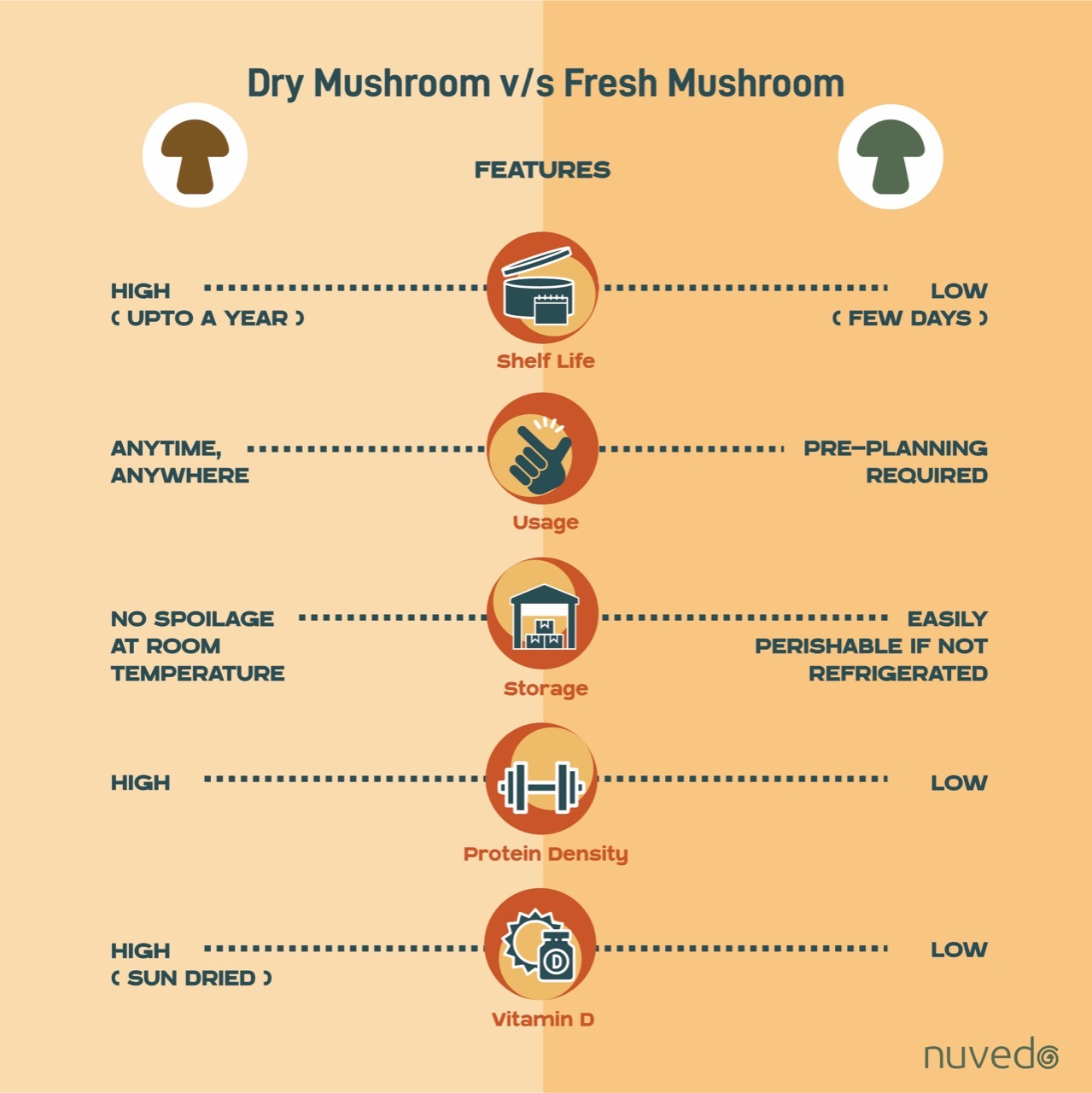“Dried mushrooms are not like dried herbs, a pale substitute for the real thing. Think raisins instead of grapes, and you have a better analogy for dried mushrooms. They have a personality all their own, worth exploring, and they can add character to an everyday dish. Omitting dried mushrooms from the shopping list is an exercise in counterproductive food snobbery.” – New York Times
Dried mushrooms – a pandemic special
Mushrooms have a wide array of tastes and a spectrum of textures that only gets deeper when we play with their constitution. Perception of whether mushrooms should be eaten fresh or dry is always a dilemma. There is always an inclination towards “fresh produce” and while that is true for most vegetables, mushrooms are unique. We’re here to bring out some of these wonderfully diverse aspects. And more importantly, to break some myths on why we should be adding more dry mushrooms to our diet.
Most of us, love the convenience of cooking and would always like to find quick hacks to make the most out of a meal. It’s no wonder, we’ve spent a few hours keeping our mothers on call, as they try to eagerly explain simpler ways to break the egg, or cook the rice, or even add the seasoning. Hacks, quick tricks, and special knacks make the idea of cooking a lot more enjoyable.
Dried mushrooms are in many ways extremely convenient, easy, affordable, and have a significantly better shelf life than their fresh counterparts. Whether you’re trying to wrap yourself a quick weeknight dinner, in between those zoom calls or need an extra dash of flavoring in that one dish, they are your savior. Their flavors can vary from mild to very intense and add an interesting new texture to any meal.
Here are some of the reasons dry mushrooms have been part of our cooking arsenal through Covid19:
Shelf Life
Dry mushrooms can be stored for long without having to worry much about them rotting, or panicking to use them because they are wilting away in your fridge. Just like New York Times says, even if we do buy grapes, that doesn’t mean we don’t eat raisins. With a shelf life of over a year, they can be a beautiful addition to your meals. We love watching these little shrooms come alive in just 20 mins of soaking them in water.
Usage
Dry mushrooms can be used any time of the year, anywhere. Carrying these dry mushrooms on a camping trip, or if you wanted to whip up a quick and easy midnight snack they’re always around. When you’re stuck in the middle of a lockdown and your grocery delivery, is a week away, they have been a great source of nutrition. Unlike fresh mushrooms, which are procured at a particular time of the year with certain varieties, you could have your stash with you throughout the year.
Storage
If you, do accidentally leave your fresh mushrooms out and you’re in for a soup. Dry mushrooms on the contrary can be stored in an air-tight box, outside, in a cupboard at room temperature. Even if you do manage to keep your fresh ones in the fridge, and miss using that paper bag– you will have moldy, soggy mushrooms for dinner. And let’s be honest, we all have been through disorganized and mismanaged phases of our refrigerators.
Protein Density
Most mushrooms are 90% water and upon drying them we’re left with protein-dense superfoods. Power-packed and full of nutrients they now, have up to 30% protein by weight. Also, helpful to know that 100gms of dry mushrooms soak up enough water to make a kilo of fresh mushrooms. So for all those who want to keep it light on the pocket, here’s the go-to, on your shopping list.
Vitamin D
Just like humans, mushrooms can convert sunlight to vitamin D. Mushrooms contain ergosterol, which gets converted to vitamin D upon exposure to sunlight. When sun-dried, they undergo this process and make for a fortified health supplement for all our days we have spent indoors. Interestingly, too, Thermal drying in the presence of UV has been proven to convert ergosterol into vitamin D and enhance the nutritional content.
Dry mushrooms are a great primary source of vitamin D for vegans who find it otherwise difficult to naturally find them.
Don’t be afraid to experiment and try mushrooms in all forms, shapes sizes (we’re not suggesting that you eat random mushrooms in your garden!). Their diversity is their strength and this exploration of tastes and textures is what brings about culinary madness.




